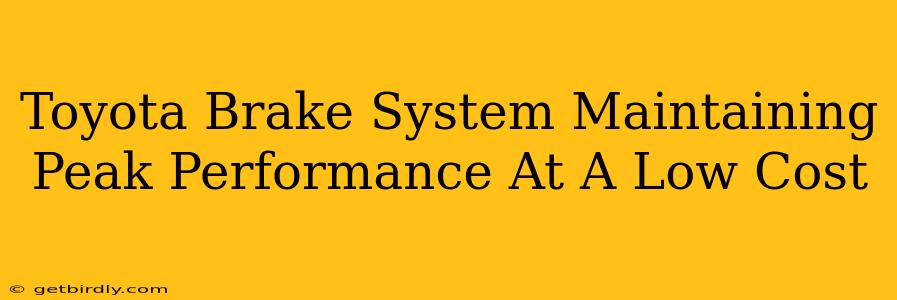Toyota Brake System: Maintaining Peak Performance at a Low Cost
Toyota vehicles are renowned for their reliability and longevity, but even the most robust braking system requires regular maintenance to ensure peak performance and safety. Ignoring brake maintenance can lead to costly repairs down the line, not to mention compromising your safety. This comprehensive guide will walk you through maintaining your Toyota's braking system effectively and affordably.
Understanding Your Toyota's Brake System
Before diving into maintenance, it's crucial to understand the basic components of your Toyota's braking system. Most Toyotas utilize a hydraulic disc brake system at the front and either disc or drum brakes at the rear. This system comprises:
- Brake Pads/Shoes: These friction materials create the stopping force. They wear down over time and need replacing.
- Brake Rotors/Drums: These are the metal discs or drums that the brake pads/shoes rub against to slow the vehicle. They can wear down, warp, or rust.
- Calipers/Wheel Cylinders: These house the brake pads and apply pressure to the rotors/drums. They can seize or leak fluid.
- Brake Master Cylinder: This component receives pressure from the brake pedal and distributes it to the wheels.
- Brake Lines and Hoses: These carry brake fluid throughout the system. Leaks can lead to brake failure.
- Brake Fluid: This hydraulic fluid transmits pressure from the master cylinder to the calipers/wheel cylinders. It absorbs moisture over time, reducing its effectiveness.
How Often Should I Inspect My Toyota's Brakes?
Regular visual inspections are key to preventing costly repairs. Aim to check your brakes at least once a month, or more frequently if you regularly drive in harsh conditions (heavy traffic, mountainous terrain). Look for:
- Low Brake Pad Material: Most Toyota brake pads have wear indicators – either a metal tab that scrapes against the rotor when the pad is worn, or a visual indicator showing the remaining pad thickness.
- Fluid Leaks: Inspect brake lines and hoses for any signs of leaks (wet spots, fluid dripping).
- Unusual Noises: Grinding, squealing, or metallic scraping sounds during braking indicate worn pads or rotors.
- Spongy or Soft Brake Pedal: This could signify air in the brake lines or low brake fluid.
- Pulling to One Side During Braking: This suggests a problem with one or more brake calipers or unequal pad wear.
What are the common signs of brake problems in a Toyota?
This question often gets asked by concerned owners. Common signs that your Toyota's brakes need attention include:
- Grinding or Squealing Noises: These often indicate worn brake pads contacting the rotor’s metal surface.
- Vibrations in the Brake Pedal or Steering Wheel: This could be caused by warped rotors or uneven pad wear.
- Longer Stopping Distances: If it takes longer to stop than usual, it’s a clear sign that your brakes are not functioning optimally.
- Soft or Spongy Brake Pedal: This indicates a problem with the brake fluid or master cylinder.
- Brake Warning Light Illuminating: This is a serious warning and requires immediate attention.
How can I save money on Toyota brake maintenance?
Saving money on brake maintenance involves proactive measures:
- Regular Inspections: Catching problems early significantly reduces the cost of repair. Regular visual checks, as described above, are crucial.
- Preventative Maintenance: Ensure your brake fluid is flushed and replaced as recommended in your owner's manual. This prevents moisture buildup and corrosion.
- Shop Around: Compare prices from different mechanics or auto parts stores before purchasing parts or scheduling service.
- Consider DIY Repairs (with caution): Replacing brake pads is often a manageable DIY task for mechanically inclined individuals, but if you’re not comfortable, it’s better to leave it to a professional. Replacing rotors, calipers, or working on the master cylinder requires specialized tools and expertise.
What are the costs involved in Toyota brake maintenance?
Costs vary significantly depending on the specific repair needed, your Toyota model, and location. Replacing brake pads is generally the least expensive repair, while replacing rotors, calipers, or the master cylinder can be substantially more costly. Always obtain quotes from multiple sources before committing to any repairs.
When should I replace my brake fluid?
Your Toyota's owner's manual will specify the recommended brake fluid replacement interval. Typically, it's every two to three years, or as per the mileage recommendation. Brake fluid absorbs moisture over time, compromising its performance and potentially causing corrosion within the brake system. Regular fluid changes are vital for maintaining optimal braking efficiency and safety.
By following these guidelines and prioritizing regular inspections, you can keep your Toyota's braking system in top condition for years to come, all while keeping maintenance costs low. Remember to always consult your owner's manual for specific recommendations and warnings. Your safety should always be the top priority.

